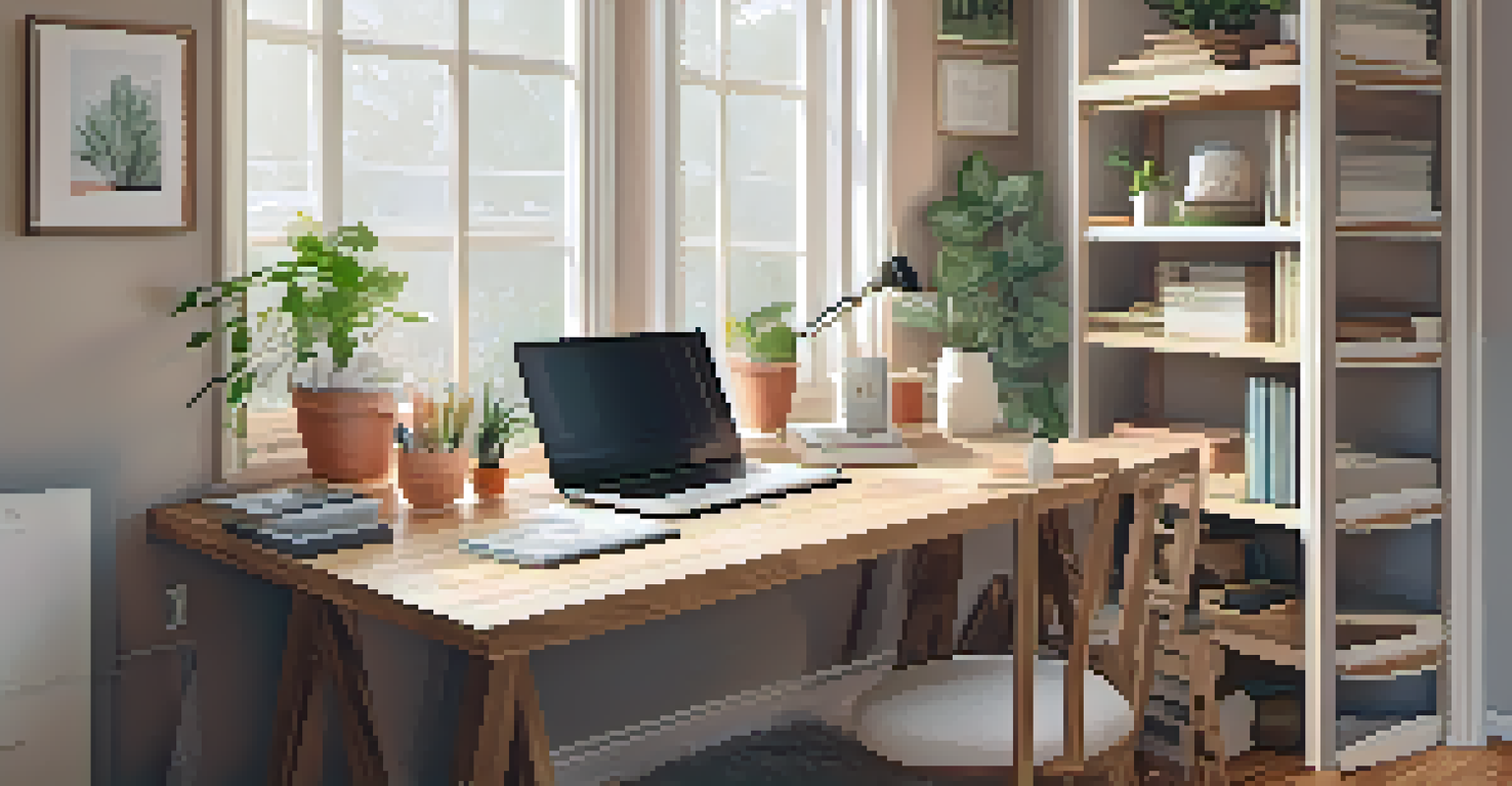How to Renovate Your Home Without Breaking the Bank

Set a Realistic Budget Before You Start Renovating
Before diving into any renovation project, it's crucial to set a clear and realistic budget. Take the time to assess what you can afford and prioritize your needs versus wants. This helps prevent overspending and ensures you can focus on the aspects of your home that matter most.
A budget tells us what we can't afford, but it doesn't keep us from buying it.
Consider creating a detailed list of all potential expenses, including materials, labor, and unexpected costs that may arise. It's wise to allocate a small portion of your budget for these surprises, as they often pop up unexpectedly during renovations. This way, you won't feel stressed if something goes awry.
Lastly, stick to your budget as closely as possible. Keep track of your spending and make adjustments if necessary. A well-planned budget not only saves you money but also keeps your renovation project organized and stress-free.
Prioritize Projects that Add Value to Your Home
When considering renovations, prioritize projects that will add significant value to your home. For instance, updating your kitchen or bathroom can yield a high return on investment. These areas are often focal points for potential buyers, making them worth the investment.

You might also consider projects that enhance energy efficiency, such as new windows or improved insulation. These upgrades not only make your home more appealing but can also lower utility bills over time. It’s a win-win situation that benefits both your wallet and the environment.
Set a Realistic Renovation Budget
Establishing a clear budget helps prioritize needs and manage unexpected costs during renovations.
Keep in mind that not all renovations need to be extensive. Sometimes, small changes like fresh paint, new hardware, or updated fixtures can make a big difference without costing a fortune. Focusing on impactful projects can help you maximize your budget effectively.
DIY: Embrace the Power of Do-It-Yourself Projects
One of the most effective ways to keep renovation costs down is to embrace DIY projects. Tackling tasks yourself can save you a significant amount on labor costs, allowing you to invest that money elsewhere. Plus, it can be a fun and rewarding experience to see your hard work come to life.
The best way to predict the future is to create it.
Start with smaller projects that match your skill level, such as painting a room or landscaping your yard. As you gain confidence, you can take on more complex tasks, like installing shelving or even tiling a backsplash. There are countless resources available online, from tutorials to forums, to guide you through the process.
However, be realistic about your abilities. If a project feels overwhelming or requires specialized skills, it’s wise to consult a professional. Knowing when to ask for help can save you time, stress, and potentially costly mistakes.
Shop Smart: Find Budget-Friendly Materials and Supplies
When it comes to home renovation, sourcing materials and supplies wisely can make a huge difference in your budget. Start by exploring local home improvement stores for sales and discounts. Many stores offer seasonal promotions that can help you save significantly on what you need.
Don't overlook alternative sources like thrift stores, salvage yards, or online marketplaces. These places often have unique finds at a fraction of the price compared to retail stores. You might discover vintage fixtures or reclaimed wood that adds character and charm to your home.
Prioritize Value-Adding Projects
Focusing on renovations that enhance your home's value, like kitchen updates or energy-efficient upgrades, maximizes your investment.
Additionally, consider purchasing surplus materials from contractors or builders. They often sell leftover supplies at reduced prices, allowing you to snag quality items without breaking the bank. Shopping smart means being creative and resourceful!
Get Creative with Upcycling Old Furniture and Decor
Upcycling is a fantastic way to save money while adding a personal touch to your home. Instead of discarding old furniture, consider giving it a new life with a little creativity. A fresh coat of paint or new upholstery can transform a tired piece into a stunning focal point.
You can also repurpose items around your home. For example, an old ladder can become a unique bookshelf, or wooden crates can be stacked to create a stylish side table. The possibilities are endless, and upcycling is not only economical but also environmentally friendly.
Incorporating upcycled items into your decor not only saves money but also sparks conversations. Guests will admire your resourcefulness and creativity, making your home feel uniquely yours.
Timing Matters: Choose the Right Season for Renovations
Timing your renovations can have a significant impact on your budget. Certain times of the year, like late fall or winter, are typically slower for contractors, meaning you might negotiate better rates. Scheduling your project during off-peak seasons can lead to substantial savings.
Additionally, be mindful of the weather when planning outdoor renovations. Spring and summer are ideal for projects like roofing or landscaping, as you’ll have the best conditions to work with. Planning around seasonal factors ensures smoother progress and can prevent unnecessary delays.
Embrace DIY and Upcycling
Taking on DIY projects and upcycling old furniture can save money and add a personal touch to your home.
Finally, consider completing your renovation projects gradually. Spreading tasks over time can help manage your budget more effectively. Rather than feeling overwhelmed by a major overhaul, tackling one project at a time can make the process more enjoyable and financially manageable.
Hire Smart: Finding Affordable and Reliable Contractors
If you decide to hire professionals for certain renovations, finding reliable contractors at a reasonable price is essential. Start by asking friends or family for recommendations, as personal referrals can often lead to trustworthy options. Check online reviews to gauge the experiences of past clients.
When interviewing contractors, be sure to get multiple quotes. This not only helps you find the best price but also gives you a sense of their professionalism and communication style. Don't hesitate to ask for references or examples of their previous work to ensure they align with your vision.

Lastly, establish a clear contract that outlines the project scope, timeline, and payment schedule. This protects both you and the contractor and helps prevent misunderstandings down the road. A well-chosen contractor can make your renovation smoother and more cost-effective.